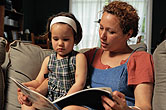- Could Artificial Sweeteners Be Aging the Brain Faster?
- Techniques for Soothing Your Nervous System
- Does the Water in Your House Smell Funny? Here’s Why
- Can a Daily Dose of Apple Cider Vinegar Actually Aid Weight Loss?
- 6 Health Beverages That Can Actually Spike Your Blood Sugar
- Treatment Options for Social Anxiety Disorder
- Understanding the Connection Between Anxiety and Depression
- How Daily Prunes Can Influence Cholesterol and Inflammation
- When to Take B12 for Better Absorption and Energy
- Epsom Salts: Health Benefits and Uses
Young Brains May Gain Skills When Parents Read to Kids


Whether it’s Dr. Seuss or Beatrix Potter, when parents read to young children it may spur brain activity that supports early reading skills, a new study finds.
Researchers led by Dr. John Hutton of Cincinnati Children’s Hospital Medical Center used MRIs to monitor the brains of 19 preschoolers, aged 3 to 5, as they listened to age-appropriate stories on headphones.
The youngsters’ parents had provided information about their interactions with their children, including how often they read to them.
While the study can’t prove cause-and-effect, being read to at home regularly was strongly linked with activation of certain brain areas involved in getting meaning from language, Hutton’s team found.
These areas play a crucial role in speaking and reading, according to study which was to be presented Saturday at the Pediatric Academic Societies annual meeting in San Diego.
There was particularly strong activation in brain areas that support mental imagery, the researchers noted. This type of visualization plays a major role in understanding narratives and readying children for reading by enabling them to “see” the story.
“This becomes increasingly important as children advance from books with pictures to books without them, where they must imagine what is going on in the text,” Hutton said in an American Academy of Pediatrics news release.
While many experts encourage parents to read to their children from birth to help promote language development, there had been no evidence that doing so might have a direct effect on the brain.
“We are excited to show, for the first time, that reading exposure during the critical stage of development prior to kindergarten seems to have a meaningful, measurable impact on how a child’s brain processes stories and may help predict reading success,” Hutton said.
However, experts note that findings presented at medical meetings are typically considered preliminary until published in a peer-reviewed journal.
More information
The U.S. National Institute on Deafness and Other Communication Disorders outlines speech and language development milestones in children.
Source: HealthDay
Copyright © 2026 HealthDay. All rights reserved.










